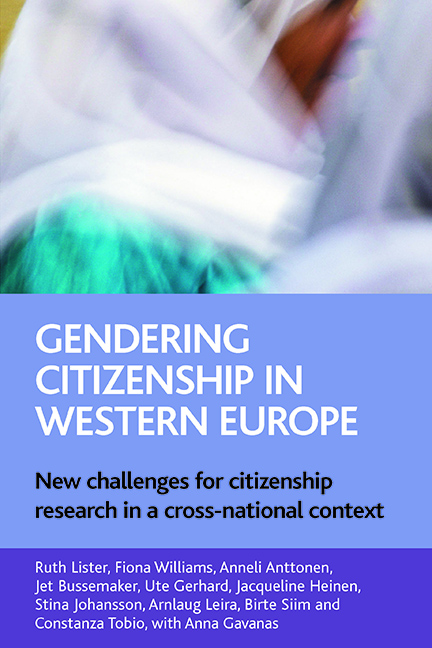 Gendering Citizenship in Western Europe
Gendering Citizenship in Western Europe Conclusion
Published online by Cambridge University Press: 15 September 2022
Summary
We have had two main objectives in writing this volume. The first, which originated in our longstanding collaboration in the research field of gendered citizenship, has been to explore the key challenges facing those who study citizenship in a cross-national context. The second has been to illustrate some of these challenges through an analysis of two important dimensions of gendered citizenship, which tend to be treated separately – care and migration – and to do so within a global context. In this brief conclusion we pull together a number of threads and raise some general issues for future research and policy making. The first part reflects on the challenges and the second expands on the fresh perspectives we believe our study offers to understandings of gendered citizenship in Europe.
Challenges
Our analysis throws up four key challenges in studying gendered citizenship in a cross-national context. These derive from: citizenship's contextual nature; the perspectives of ‘lived citizenship’; the inadequacy of existing cross-national data for our purposes; and the need to study the gender culture within which policy packages are enacted, together with their differential usage across gender, class and ethnic lines, in order to understand the policies’ meanings for and impact on gendered citizenship.
As we explained in the Introduction and Part One, context matters when understanding citizenship both as an academic and political concept and as lived experience. Vocabularies of citizenship may appear superficially similar in different countries but the meanings attached to the words are not always the same (Bellamy, 2004). Contemporary understandings of citizenship are the product of different historical and legal traditions and institutional and cultural complexes (frequently articulated in terms of welfare, care, gender, citizenship and migration regimes). They also reflect the processes by which citizenship rights came to be established – whether as the product of struggle from below or of anticipatory state action from above or a combination of both (Turner, 1990).
These statements are made on the basis of political and theoretical writings about citizenship. However, an even greater challenge faces us as we try to understand the lived experience of citizenship in a cross-national context. The notion of ‘lived citizenship’ is about ‘the meaning that citizenship actually has in people's lives and the ways in which people's social and cultural backgrounds and material circumstances affect their lives as citizens’ (Hall and Williamson, 1999, p 2).
- Type
- Chapter
- Information
- Gendering Citizenship in Western EuropeNew Challenges for Citizenship Research in a Cross-National Context, pp. 167 - 176Publisher: Bristol University PressPrint publication year: 2007


